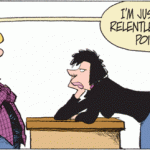Winning the argument or listening?

The festive season is upon us. According to experts commenting on the subject in magazines and newspapers, it could equally be called the arguing season. A friend in an early Christmas party bemoaned the arrival of her in-laws, bringing with them different opinions on Brexit and other political issues that, sooner or later, led to uncomfortably heated confrontations.
And just two days ago, what started as a really interesting discussion in our house – on why so many men failed to recognise that rape and wolf-whistling were on the same continuum, on the way in which power relationships skewed jokes and banter, on whether it was ever acceptable to use racial identity to comic effect – morphed into one of those confrontational exchanges from which at times it feels there’s no coming back.

© Scott and Borgman
And it got me thinking, in an end-of-year valedictory fashion, why it was that discussions, arguments and debates these days so quickly became polarised, and the position taken by the opposing individuals so firmly entrenched. (And is it just ‘these days’? Was it always like this?) What starts out as an exchange of views transmutes into an exchange of fire, and people’s positions end up ludicrously exaggerated – as Hella Eckardt’s recent blog illustrated, in relation to Roman Britain. People at either end of the spectrum insist on the absolute truth of their position with a strident vehemence that doesn’t represent the reality – which is that all of us, bar the most extreme fanatics, recognise the possibility of alternative positions even when firmly convinced of our own. But rather than examine the evidence, listen to whether the other speaker brings something new to the debate that might cause us to reconsider, it suddenly seems more important at any cost to win this argument, to prove that our position is right and the other’s wrong.
Is this failure to discuss and the associated need to win spawned by the structure of our institutions? The adversarial position is hard-wired into our legal system, for example, and also into Parliament (at least, certainly the House of Commons); it used to, and may still, be at the heart of university research and debate; and it’s of course the basis of all sporting activity. It’s clearly not unique to the UK (the US displays it in spades) but is it uniquely Anglo-Saxon, or European, or Western? Are there countries and cultures where winning an argument is less important than hearing what everyone has to say?
These questions lie at the heart of what we are attempting with the Migration Museum. If our concern was to win the argument (whatever that might be) or show other people the error of their ways, we would, rightly, be doomed to failure and unworthy of support. But what we are wanting to do is to create a space where people can debate issues of paramount importance without automatically taking up tired and predictable positions and seeing who can shout the loudest. Our strapline – all our stories – was chosen to reflect both the fact that if you scratch the surface of anyone’s family history in Britain, you will find a migration story, but also, crucially, the recognition that everyone has a say in this matter and all have a right to be listened to, even if some might find their views unacceptable.
It’s not a new year’s resolution, because it’s been the nub of what we’ve been doing since the beginning, but listening and allowing the spectrum of opinions to be heard without it all descending into the weary Twitterati scrimmage of rancour and animosity – that’s what we’ll continue to do in 2018. With Brexit, Trump and other factors casting their divisive, polarising shadow, it seems more important than ever. So, if you’re raising a glass over this festive period, here’s to listening, not fighting.
To all our readers and followers, have a really good break over the festive period, and see you again in the New Year.

